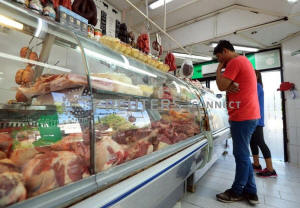Steak-crazy Argentines keep buying beef even after peso crash inflates
prices
 Send a link to a friend
Send a link to a friend
 [August 28, 2019]
By Hugh Bronstein and Marina Lammertyn [August 28, 2019]
By Hugh Bronstein and Marina Lammertyn
BUENOS AIRES (Reuters) - Times are hard in
recession-hit Argentina and the peso currency's latest crash has jolted
food prices higher.
But in a country where eating beef is considered more a right than a
luxury, people are stretching their budgets to keep buying steak while
butcher shops see profit margins shrink.
Social life revolves around weekend barbecues for Argentines, rich and
poor. The cherished image of the gaucho cowboy, wandering the pampas on
horseback and dining on top quality steak around the fire, is as much a
part of the nation's identity as the tango, Evita Peron, and financial
crises.
The latest economic setback occurred earlier this month when a landslide
victory for the populist opposition in an Aug. 11 primary vote sparked a
run on the peso and hobbled business-friendly President Mauricio Macri's
campaign to win a second term in October's presidential election.
Stunned by the peso's fall, Argentina's cattlemen - who export much of
their produce - pulled back from selling and waited for the volatility
to pass.

The supply cut had the effect of raising prices. Many Argentines kept
buying steak, nonetheless, opting to cut household budgets in other
areas before depriving themselves of their main source of protein.
"Argentines can stop buying clothes and other items but they won't stop
buying meat, even while they complain about prices," said Orlando Mamani,
working a meat counter in a grocery store in the Buenos Aires
neighborhood of Belgrano.
And complain they did, even as they lined up to buy at butcher shops
across the capital.
"Prices are up 15% to 20% since the primary. The election result was
really a surprise," said Julio Basmagian, 70, as he left a butcher's
store with purchases under his arms.
"Beef for us is very important. It's very unusual for an Argentine to
get through a day without eating beef in one form or another."
But as a retiree living on a fixed income, Basmagian said he may have to
cut back if prices keep rising. "I just don't have the budget," he said.
Consumer price inflation is expected at more than 3% this month, Macri
said on Tuesday, up from 2.2% in July. But meat price increases seem to
be outpacing inflation, according to consumers and butchers interviewed
by Reuters. Official price data for August will not be available until
next month.
With Argentina's main parties having already chosen their presidential
candidates, the primary served as an opinion poll ahead of October's
election.
[to top of second column]
|

A man looks at meat on display inside a butcher shop in Buenos
Aires, Argentina October 29, 2018. Picture taken October 29, 2018.
REUTERS/Marcos Brindicci

Macri's poor performance caused an 18% slide in the peso, raising
default fears by making it harder for Argentina to honor its
dollar-denominated debts. It has revived memories of Argentina's
2001-2002 default and economic crisis, which tossed millions of
middle-class Argentines into poverty.
GIZZARD KING
"It is not that meat is very expensive. It's that wage earners
believe it is very expensive because they believe they have the
right to eat beef every day," said Miguel Schiariti, head of
Argentina's CICCRA meat industry chamber.
Schiariti said supply had dropped 30% at Buenos Aires' main
livestock market of Liniers after the primary.
"When prices go up like this, everyone complains, including me,"
said butcher Miguel Narciso, 57, while he cut thin slices of beef
used to make the popular local dish milanesa.
"The demand is always there. But supply goes down when ranchers get
nervous about the peso and wait to see what's going to happen before
selling," said Narciso, his white apron splattered with blood at a
butcher shop called Nucho in the middle-class Buenos Aires
neighborhood of Caballito.
His boss, Carlos Principe, the capital's self-anointed "Gizzard
King" - emblazoned in red letters on the shop's overhead sign - has
heard complaints from clients over rising prices since the primary
threw Argentine politics on its head.
"Ranchers cut back livestock supply due to the uncertainty, so
livestock prices rose 18%. But I can't raise my retail price by more
than about 10% without losing customers," Principe said.

"So we are losing money for now but what am I gonna do? I have a
business to maintain and employees who have to keep working."
(Reporting by Hugh Bronstein and Marina Lammertyn; Additional
reporting by Miguel Lobianco; Editing by Rosalba O'Brien)
[© 2019 Thomson Reuters. All rights
reserved.]
Copyright 2019 Reuters. All rights reserved. This material may not be published,
broadcast, rewritten or redistributed.
Thompson Reuters is solely responsible for this content. |